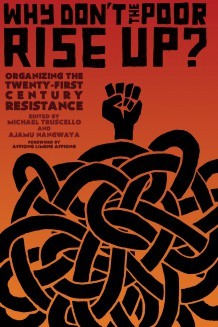Why Don’t the Poor Rise Up?
An article in the New York Times in 2015 provoked Michael Truscello and Ajamu Nangwaya to bring together the volume: "Why Don't the Poor Rise Up? Organizing the Twenty-First Century Resistance" (2017). This book is divided into two sections, one on the Global North and another on the Global South, and is an "anthology of radical perspectives on contemporary struggles" (p. 2). The book is a counter narrative to the idea suggested in the New York Times that the poor are not rising up. "The title is both challenging and provocative, in the sense that it is at once a question and an assumption. But is it true that the poor do not rise up? Or do we simply not recognize their resistance and rebellion?" (p. 1). In documenting stories of resistance, the authors seek to address an apparent gap: "We do not have enough knowledge and information on the diverse struggles waged around the world, the wealth of experiences gained, and the lessons learnt from them and numerous victories achieved. Consequently, we do not celebrate them nor gain inspiration from them to wage new struggles. The first-hand experiences and contributions shared in this collection serve as a radical attempt to reverse this trend" (p. 3).
There are eighteen examples, well beyond summary in a brief post. In general, I had hoped the book would have delved deeper. Many of the chapters are brief descriptive summaries of challenges faced and responses. Readers familiar with this literature might be left wanting. However, for those who do wonder 'why the poor do not rise up', this is a collection worth reading. Two thought provoking quotes:
From Praba Pilar and Alex Wilson: "An early example of these confining constructs was the "Inter Caetera," a papal bull issued by Pope Alexander VI in 1493 that laid out the justification for the Doctrine of Discovery. It established that Christian nations had a divine right (based on the bible) to grant themselves legal ownerships of any "unoccupied" lands (where unoccupied was defined as the absence of Christian people) and dominion over any people on those lands. A current example of these confining constructs is the salvation narrative unconsciously reproduced by many in the white Left when approach Indigenous and other non-European communities as allies but present solutions that have been developed in isolation, are paternalistic, and/or are inappropriate to the context. Salvation narratives are often seen as benign, but they are not. hey reflect and perpetuate the early justification for colonization, i.e., that "God had directed [Europeans] to bring civilized ways and education and religion to Indigenous Peoples and to exercise paternalism and guardianship powers over them'" (p. 35)
From Gussai Sheikheldin: "States and markets normalize the exploitation and oppression of many in society through the pretext of order and justice… becoming aware of a phenomenon does not automatically imply that one will care to transform it, so understanding structural sources of oppression in society does not necessarily mean that one will seek to combat them. That is objectively true, but we should also be mindful that any genuine care is unlikely to happen without understanding. Then there's the difference between understanding on the one hand, and 'consciousness' (understanding and caring) on the other." (p. 233-235).

